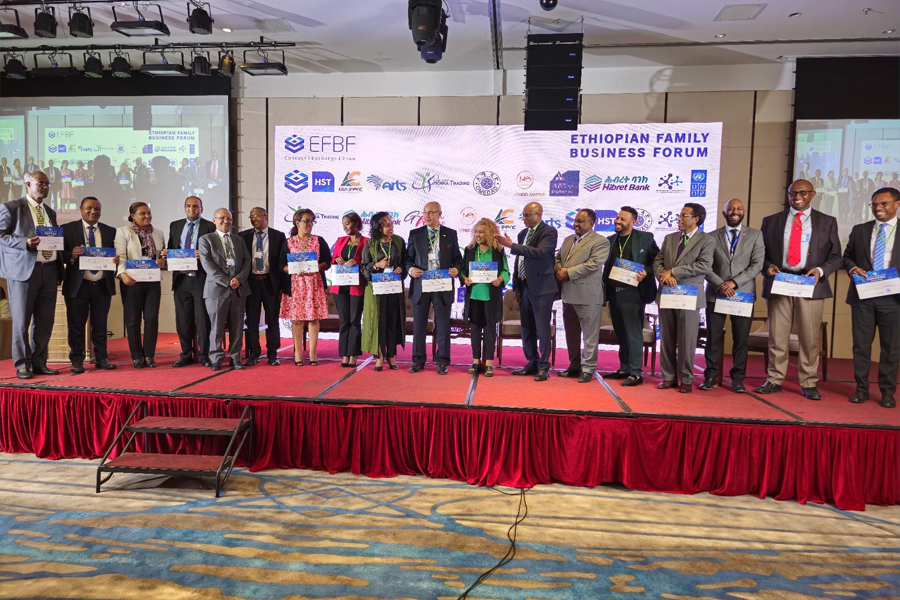
Radar | Nov 16,2024
Aug 12 , 2023
By AKSAH ITALO ( FORTUNE STAFF WRITER )
Addis Abeba captures the story of a country in rapid changes. As vehicles whiz past newly constructed high-rises and markets teem with activities, the landscape reveals a defining chapter in Ethiopia’s journey towards industrialisation.
But beneath this narrative of progress, there is an unsettling subplot. Substantial portions of the city’s workers, estimated to be over 30,000, are employed under private employment agencies. And many of them are crying foul.
A letter dispatched a month ago by Tekalign Ayalew (PhD) from the Ministry of Labour & Skills to bureaus across the country sounded the alarm bell. It called for immediate legal action against agencies violating labour laws.
The backdrop to this is persistent concerns over how these employment agencies handle the workers’ wages in their payrolls. Many agencies are allegedly withholding up to 20pc of workers’ monthly earnings.
This cap is not an arbitrary figure. It has been a bone of contention for years.
Two years ago, the issue reached Ethiopia’s Supreme Court. The Justices - Solomon Areda, Berhanu Amenew, Teshome Shiferaw, Habtamu Erqyihun and Netsanet Tegegn - eventually ruled in favour of maintaining the 20pc cap on agency rates. However, the road from a judicial ruling to enforcement is often bumpy. A lack of a regulatory framework made ensuring agencies abided by the ruling challenging.
For Dejene Bekele, director of employment and labour market at the Ministry, the message to errant agencies is unambiguous.
“Strict measures will be enforced,” he emphasised, underscoring the federal government’s commitment to protecting worker rights.
State Minister Nigusu Tilahun warned agencies to consider his Ministry’s directive, threatening legal actions against those who fall short of their duty.
The allure of private employment agencies is not hard to fathom. The rapid pace of urbanisation, catalysed by massive rural-to-urban migration, has made these agencies indispensable. They act as bridges between the swelling ranks of job seekers and businesses in dire need of a workforce. In the previous year alone, the labour market saw an entry of 96 new employment agencies.
However, the number does not necessarily translate to quality. An alarming study by the International Labour Organization (ILO), based on a survey of 400 agency-recruited workers, paints a bleak picture. It unearthed rampant violations, from lower health and safety standards to contractual agreements and unionisation rights limitations.
Too many agencies, the study discovered, are ill-equipped to deliver on their obligation to their workers.
Authorities of the Addis Abeba Labour Enterprise & Industry Bureau decided to dive deep. They undertook the task of scrutinising the business conduct of 316 agencies. Their findings were telling.
Sebehadin Sultan, the employment expansion director at the Bureau, disclosed that over 109 agencies were shut down, albeit temporarily. The reasons varied from lack of permits and subpar office facilities to questionable organisational structures.
But it is not just bureaucratic violations that have agencies in the crosshairs. Violations of workers’ rights could lead to even more stringent actions, including permanent license revocation.
Kassahun Follo, a prominent figure in the Ethiopian labour circles serving as the president of the Confederation of Ethiopian Trade Unions (CETU), has been vocal about his concerns. In a strongly worded letter to the Ministry, he tried to draw attention to some agencies’ strategies to trim costs, particularly in the absence of a robust legislative framework. He decried the practices as “against the national labour standards.”
Kassahun is not alone in his campaign for justice.
Federation of Tourism, Hotels & Service Union leaders have tried to mediate between the conflicting parties. But, as Asfaw Abebe, the Federation’s president, recalled, the result has been a stalemate, compelling the Federation to plead to higher authorities.
“The treatment of agency employees is dreadful,” he said.
The ramifications of these issues are global. A World Employment Confederation report highlighted that the employment industry’s revenue stood at a staggering 491 billion euros in 2016. Of this, agency work contributed 350 billion euros.
In Ethiopia, the story is simultaneously promising and cautionary. Federal authorities want to see nearly three million young Ethiopians enter the labour market annually. The unemployed youth's aspirations and dreams, hinged on finding meaningful employment, rest heavily on the collaborations between officials of the Public Employment Services (PES) and Private Employment Agencies (PrEAs).
Yet, the veil of optimism often conceals grim tales.
Take the story of Habtamu Tsegaw, once a security guard under Lion Security Service Plc., an agency that has found itself under the radar. Habtamu’s account is rife with grievances, from wage cuts to threats of arbitrary dismissal.“
"The agency doesn't even pay us the mere 15pc”," he told Fortune.
The management fired union representatives, including Habtamu, who was the labour leader at the time.
While workers like Habtamu voice their grievances, agency heads like Lion's founder Abel Worku offer a counter-narrative. His company was incorporated in 2006; it employed over 5,000 people assigned to several companies. He contends that many criticisms overlook the agencies’ financial constraints, especially given the 20pc cap.
Abel conceded that his management had let go of employees that were "disrupting the day-to-day activities and plummeting the productivity of employees.”
"It was done for a greater good,” he said.
Experts suggest a nuanced approach.
Aida Awel, a chief technical advisor at the ILO, believes that a blend of policy evolution and awareness campaigns is the way forward. She advocates for a legislative framework that is both just and flexible, benefiting all the parties in this intricate employment tapestry.“
"The laws should be adept at protecting all,” she said.
PUBLISHED ON
Aug 12,2023 [ VOL
24 , NO
1215]

Radar | Nov 16,2024

News Analysis | Mar 02,2024

Fortune News | Mar 06,2021

In-Picture | Mar 16,2024

Radar | Mar 02,2024

Agenda | Sep 22,2024

Radar | Jul 17,2022

Radar | Jan 16,2024

Radar | May 31,2025

Advertorials | Feb 12,2024

Dec 22 , 2024 . By TIZITA SHEWAFERAW
Charged with transforming colossal state-owned enterprises into modern and competitiv...

Aug 18 , 2024 . By AKSAH ITALO
Although predictable Yonas Zerihun's job in the ride-hailing service is not immune to...

Jul 28 , 2024 . By TIZITA SHEWAFERAW
Unhabitual, perhaps too many, Samuel Gebreyohannes, 38, used to occasionally enjoy a couple of beers at breakfast. However, he recently swit...

Jul 13 , 2024 . By AKSAH ITALO
Investors who rely on tractors, trucks, and field vehicles for commuting, transporting commodities, and f...

Jun 28 , 2025
Meseret Damtie, the assertive auditor general, has never been shy about naming names...

Jun 21 , 2025
A well-worn adage says, “Budget is not destiny, but it is direction.” Examining t...

Jun 14 , 2025
Yet again, the Horn of Africa is bracing for trouble. A region already frayed by wars...

Jun 7 , 2025
Few promises shine brighter in Addis Abeba than the pledge of a roof for every family...